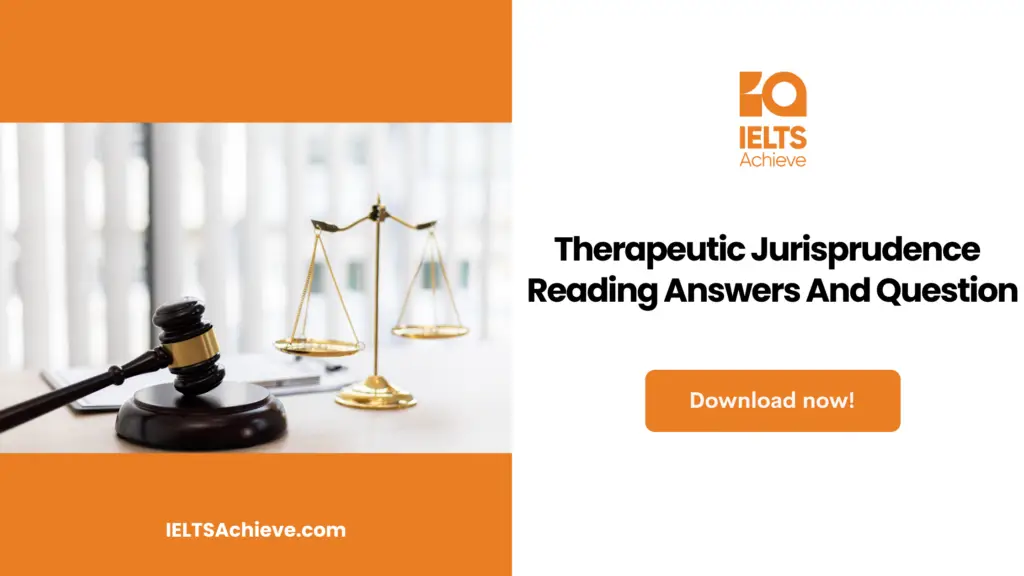The Blog post contains the following IELTS Reading Questions:
- IELTS Reading True/False/Not Given
- IELTS Reading Note Completion
- IELTS Reading Sentence Completion
Stay informed and prepared for success – Explore our comprehensive Reading Test Info page to get valuable insights, exam format details, and expert tips for mastering the IELTS Reading section.
IELTS reading passage – Therapeutic Jurisprudence

Therapeutic jurisprudence: An Overview
The study of how the law functions as a therapeutic agent is known as therapeutic jurisprudence. It focuses into how the law affects psychological health and emotional wellbeing, as well as its therapeutic and antitertherapeutic effects. The areas of family law, criminal law, juvenile law, and mental health law are where it is most useful.
The overall objective of therapeutic jurisprudence is to humanize the law as more approachable by taking into account the human, emotional, and psychological dimensions of the legal system. By emphasising that the law is a social force, it encourages the view that it is responsible for shaping individual behaviour and the outcomes that follow. The goal of therapeutic jurisprudence is to have laws developed or applied in a more therapeutic manner, so long as other principles, such as justice and due process, are not compromised. Despite popular belief, therapeutic jurisprudence does not imply that therapeutic purposes should take precedence over other goals. To the contrary, it rejects any form of authoritarianism or tyranny. A more nuanced perspective on the law allows us to discuss topics and questions that have been mostly ignored in the past.
The following categories can be used to categorise laws: (1) Norms of law. (2) the conduct of judges, attorneys, and therapists operating in a legal setting, and (3) the roles of legal actors, such as hearings and trials. Many actions taken by legal actors, such as conversations between judges and defendants or between attorneys and clients, have an effect on the psychological health or emotional life of those who are subject to the law. This third type is especially appropriate for therapeutic jurisprudence.
The practise of therapeutic law is a recent development. Early on, attitudes toward the law were significantly different, and the main emphasis of efforts was on the flaws in various types of testimony. Even though there were valid grounds for that initial emphasis, it is severely myopic to only consider what is wrong rather than also considering what is right and how these parts could be improved. The focus of therapeutic jurisprudence is on this previous underappreciated component, and it encourages us to examine carefully for promising advancements and to take from the behavioural science literature, even when there is no clear connection between the two fields. It inspires individuals to creatively consider the ways in which potential advancements from other professions might be incorporated into the legal system.
Because of this comprehensive approach, recently, some promising-looking rehabilitation programmes have started to emerge. In one form of cognitive behavioural therapy, patients are encouraged to create relapse prevention plans, which requires them to consider the chain of events that lead to criminal behaviour. These reasoning- and rehabilitation-style programmes instruct offenders in cognitive self-change, how to pause, consider the implications, foresee high-risk situations, and figure out how to handle or avoid them. These programmes appear to have had some degree of success thus far.
From the point of view of therapeutic law, the question is how these programmes could be made part of the law. In one obvious way, these problem-solving, reasoning, and rehabilitation-type programmes can be offered to a large number of people in both prisons and the community. One way to tie them even more closely to the law would be to include them in the legal process. If a judge or parole board knows about these methods and is about to decide whether or not to give someone probation, the judge might say. I’m going to think about you, but I want you to come up with a rough plan to prevent relapse that we can use to talk about. I want you to figure out why they should let you go on probation and why they should be sure you’ll do well. So that I could feel at ease. I need to know what kinds of situations you think are dangerous and how you plan to avoid or deal with them.
If that method is used, the courts will be encouraging cognitive self-change as part of the sentencing process. The process might go like this: a criminal would say something like, “I know I get in trouble on Friday nights, so I propose that I stay at home on Friday nights.” All of a sudden, it’s not a judge making the offender do something. Since the person who broke the law came up with it, he or she should think it is fair. If a person has a say in his rehabilitation, he is more likely to care about it, and if he cares about it, he is more likely to do what he needs to do.
Unlock your full potential in the IELTS Reading section – Visit our IELTS Reading Practice Question Answer page now!
Recommended Questions:
Renewable Energy IELTS Reading Question with Answer
Therapeutic Jurisprudence reading questions
Questions 1-3
Do the following statements agree with the information given in the Reading Passage? In boxes 1-3 on your answer sheet, write
TRUE if the statement is true
FALSE if the statement is false
NOT GIVEN if the information is not given in the passage.
1. Offenders might be encouraged by judges to take part in deciding what their punishment should be.
2. Therapeutic jurisprudence aims to make cognitive behavioural treatment a part of legal process itself.
3. The use of rehabilitative programmes has been proved to greatly reduce the chance of a criminal re-offending.
Enhance your skills in identifying information as True, False, or Not Given. Click here to discover expert strategies and techniques for mastering this question type in the IELTS Reading section.
Questions 4-10
Complete the notes below.
Choose NO MORE THAN ONE WORD from the passage for each answer.
Therapeutic Jurisprudence:
study of the law as a therapeutic 4 ________ and the therapeutic and 5 ________ consequences of the law.
Goal:
to 6_______ the law, but NOT at the expense of 7 ________ and due process.
Applicable to:
especially applicable to the role of legal 8 _______ such as judges and lawyers.
Therapeutic jurisprudence = new attitude
It asks people to seek out 9________ developments, not problems. It urges people to think 10________ and borrow from other fields.
Boost your performance in Summary, Notes, Table, and Flowchart Completion tasks. Click here to explore our detailed guide and learn how to effectively complete summaries, notes, tables, and flowcharts in the IELTS Reading section.
Questions 11-13
Complete the sentences.
Choose NO MORE THAN THREE WORDS from the passage for each answer.
11. The treatment requires offenders to consider the _______ that lead to a crime being committed.
12. Treatment programmes encourage offenders to recognise _________ before they happen, and know what to do in case they happen
13. One aspect of cognitive behavioural treatment includes the preparation of ________ by offenders.
Enhance your sentence completion skills in the IELTS Reading section. Click here to access our comprehensive guide and learn effective strategies for filling in missing words or phrases in sentences.
Unlock your full potential in the IELTS Reading section – Visit our IELTS Reading Practice Question Answer page now!
Recommended Questions:
Renewable Energy IELTS Reading Question with Answer
Therapeutic Jurisprudence reading answers
1. FALSE
2. TRUE
3. NOT GIVEN
4. AGENT
5. ANTITHERAPEUTIC
6. HUMANIZE
7. JUSTICE
8. ACTORS
9. PROMISING
10. CREATIVELY
11. CHAIN OF EVENTS
12. HIGH-RISK SITUATIONS
13. RELAPSE PREVENTION PLANS

We hope you found this post useful in helping you to study for the IELTS Test. If you have any questions please let us know in the comments below or on the Facebook page.
The best way to keep up to date with posts like this is to like us on Facebook, then follow us on Instagram and Pinterest. If you need help preparing for the IELTS Test, join the IELTS Achieve Academy and see how we can assist you to achieve your desired band score. We offer an essay correction service, mock exams and online courses.

